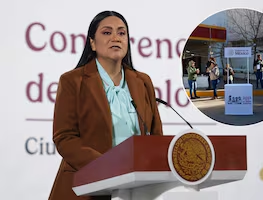Más Información

Sheinbaum: Con la 4T el pueblo de México recuperó su dignidad; “hay que estar muy orgullosos”, destaca

Sheinbaum agradece respaldo de gobernadores de oposición; “decidimos trabajar juntos para el bienestar de México”, dice

La Clínica es Nuestra se suma al ISSSTE: Batres; podrán utilizar recursos para mejorar infraestructura

Bienestar supervisa centros para migrantes; deportados podrán permanecen hasta tomar “decisiones de vida”
Mexico City
's Human Rights Commission , through its president , Nashieli Ramírez Hernández , has asked the Supreme Court to invalidate the city's 60th article established in the Human Rights Law, which deals with the eviction of defaulting tenants.
Nashieli Ramírez
is looking to overrule a reform approved by Congress in June 2019. It established that evictions should be preceded by a warrant that guarantees the occupants the right to a trial and privileges a settlement between both parties. According to Ramírez Hernández , the reform implemented in June does not comply with international norms and does not prevent or punishes violent evictions , which she considers as a threat to health and personal integrity .
Nashieli Ramírez
claims that the previous article established respect for the tenants on trial . Now she is requesting compensation when their property is damaged or stolen during the eviction , as well as their immediate relocation and their inclusion to government housing programs .
For this, she proposes a socioeconomic study to asses the economic capacity of a person to pay rent , as well as guarantees offered by the local government not to evict defaulting debtors as long as authorities don't find a similar home located less than 15 kilometers away from the property in dispute.
It is true that any government hopes to guarantee the right to have a home to its citizens, but this shouldn't favor the deterioration of a private property owned by a third party who had previously signed a contract with the debtor .
Let's not forget that both parties previously established a contract to rent a property and the tenant also has obligations to fulfill but when this is not the case, this causes several problems to the homeowner because they have invested resources on a property that was supposed to generate an income and also has to pay taxes .
Therefore, favoring debtors violates the rights of landlords . This legal jargon deserves an in-depth analysis.
gm






